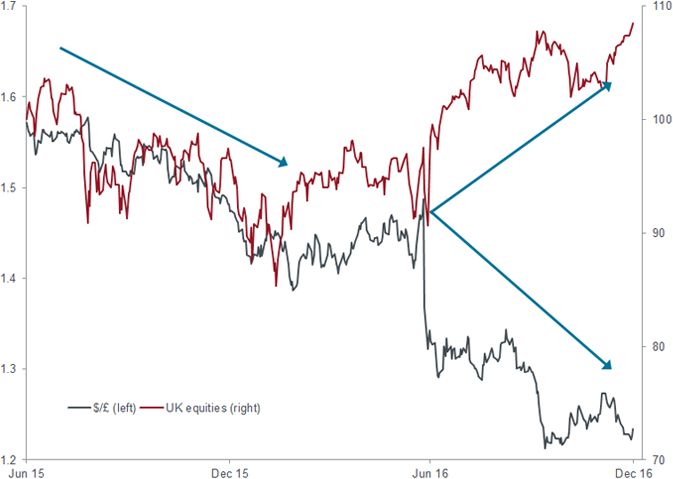
Janus Henderson: Brexit - will UK stocks get pounded?
Sterling is the clearest barometer of market sentiment about the outcome of the UK’s expected departure from the European Union (EU) next March. The situation after March 2019 is still uncertain.
11.10.2018 | 09:24 Uhr
However, the approaching deadline is pushing investors to look at the impact of moves in sterling on UK assets. Investors must consider the sentiments that are likely to drive moves in sterling, regardless of their personal political view.
A move lower in sterling would suggest investor concern about the UK’s future prospects. However, a weaker pound has historically pushed UK equities higher as the majority of corporate profits are made overseas (see chart 1). But this time could be different.

The period prior to the referendum on EU membership is instructive. From mid-2015 sterling trended lower as uncertainty built. UK equities drifted lower alongside the weakening pound. Uncertainty became a drag on UK assets as the risk premium rose.
The immediate reaction to the ‘Leave’ result was also insightful. UK equities moved sharply lower, alongside the pound. It wasn’t until investors calmed down - and appreciated that nothing had actually changed yet - that the usual correlation reasserted itself. After all, the UK was still part of the EU. The continued slide in sterling subsequently helped to drive very strong performance for UK stock prices.
The direction of sterling from here will indicate if investor perceptions of whether the terms on which the UK leaves the EU are favourable or unfavourable. However, distinct from much of recent history, UK stocks might fall if the pound declines. Unlike immediately after the referendum, trading terms for companies may start to change, potentially dampening the benefits of a weaker currency. Higher barriers to trade have hurt Chinese companies recently; the same can be expected for UK firms. However, the planned transition period with the EU may limit the impact to exports outside Europe, even if only in the short term.
This is not to suggest that there is not some attraction to UK stocks at the moment. Valuations are below their average over the last 15 years, unlike many other regions. Earnings growth is currently expected to remain in the upper single-digits over the next few years. The dividend yield remains elevated compared to history. However, investors must note that the ride might be a little bumpy as Brexit sentiment ebbs and flows.




Diesen Beitrag teilen: